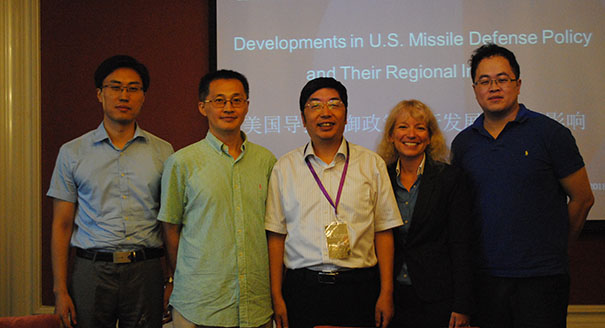Registration
You will receive an email confirming your registration.
U.S. missile policies and defense capabilities have long influenced East and Northeast Asia’s security outlook. While the United States argues that its deployment of the THAAD missile defense system in South Korea is necessary to counter the nuclear threat from North Korea, Chinese experts worry that U.S. missile defense assets in the region could undermine China’s strategic nuclear deterrent capability. The dispute over the THAAD deployment is just one recent example of how divergent perceptions of missile defense systems can damage regional bilateral and multilateral relations. In anticipation of the release of the Trump administration’s Missile Defense Review, this roundtable discussion will closely examine recent changes in U.S. missile defense policy and their potential impact on major power security relationships in the region.
Tong Zhao moderated this timely discussion featuring Li Bin, Wu Riqiang, Lora Saalman, and Liu Chong on new developments in U.S. missile defense policy and how they shape the Asia-Pacific security landscape.
This event was off the record.
DISCUSSION HIGHLIGHTS
- Changing Architecture of U.S. Missile Programs: Panelists discussed the history of American anti-missile programs, analyzing the past to understand the current direction of U.S. missile defense ambitions. Several panelists noted a shift in the technology’s application from a deterrent for rogue nations to a strategic weapon against major powers. They expressed varying degrees of skepticism, however, about the purpose of U.S.-China discussions on anti-missile discussions given the history and motivations behind both American and Chinese missile defense programs. The U.S., some argued, is unwilling to discuss de-escalation of the anti-missile arms race given its current technological advantages. Interestingly, China, others said, is also not focused on de-escalation when entering anti-missile discussions; instead, it sometimes uses the topic as political cover in order to avoid other more contentious issues and debates.
- De-Escalation and Double Standards: Unable to identify concrete steps the U.S. or China could take toward de-escalation, discussants analyzed the factors that led to this geopolitical gridlock. They identified double standards as primary sources of tension over anti-missile programs; the U.S. and China each want the other country to halt its missile defense programs while refusing to slow down their own. This environment breeds uncertainty, which, some claimed, only accelerates weapons development. That said, discussants argued that if China is to continue its rise to become a major world power, it must continue developing more sophisticated anti-missile capabilities. Ending on an optimistic note, the discussants noted how the goals of anti-missile technology are world peace and stability.
- Development of and Strategy Behind Chinese Missile Technology: Focusing on the current gap between American and Chinese military capabilities, discussants explored Chinese military development strategies and Beijing’s corresponding long-term geopolitical objectives. Some argued that despite the supremacy of U.S. anti-missiles capabilities, tactics like decoy missiles largely render the U.S. technological advantages obsolete. Yet, scholars warned that this does not imply that China will stop advancing its own anti-missile technologies. For China to assume a larger role on the world stage, it will have to develop its missile defense program.
- Implications of U.S. LRDR Capabilities: Panelists explored the implications of new American Long Range Discrimination Radar (LRDR) technology in the Asia Pacific Region. Given the potential range of American LRDR technology, some discussants argued that U.S. anti-missile detection facilities in Japan or South Korea could also track Chinese military activity. This would severely damage Beijing’s second strike nuclear capabilities and upset regional stability. Other participants, however, argued that experts should only consider the current confirmed capabilities of U.S. anti-missile technology when making strategic decisions. Furthermore, short detection ranges limit the reach of U.S. anti-missile facilities, effectively moving western Chinese military bases out of detection range and preserving Chinese second strike capabilities.
Tong Zhao
Tong Zhao is a fellow in the Nuclear Policy Program at the Carnegie Endowment for International Peace, based at the Carnegie–Tsinghua Center for Global Policy in Beijing. His research focuses on strategic security issues, including nuclear weapons policy, arms control, nonproliferation, missile defense, space security, and China’s security and foreign policy.
Li Bin
Li Bin is a senior fellow working jointly in the Nuclear Policy Program and the Asia Program at the Carnegie Endowment for International Peace. A physicist and expert on nuclear disarmament, his research focuses on China’s nuclear and arms control policy and on U.S.-Chinese nuclear relations.
Wu Riqiang
Wu Riqiang is an associate professor at the School of International Studies at Renmin University of China.
Lora Saalman
Lora Saalman is vice president of the Asia-Pacific Program at the EastWest Institute.
Liu Chong
Liu Chong is deputy director of the Institute of International Security and Arms Control at the China Institute of Contemporary International Relations (CICIR).
